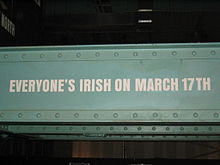Facebook And Your Privacy
One of the major points that Facebook scored over all of the other social networking sites, at least initially, was its stringent privacy settings that gave you a sense of security and safety regarding the contents of your profile on Facebook. However, with the advent of Twitter and other such sites, Facebook might be in a mood to keep up with the growth of its competitors - and this might be why now Facebook content is easily accessible to strangers and gone are the days when you had a sense of privacy that only you and your exclusive friends shared on the network.
Posted by: Interesting Facts Team
http://www.interestingfacts.org/fact/facebook-and-your-privacy
March 17th. - St. PATRICK'S DAY
See the History Channel explanation for St. Patrick´s Day
Saint Patrick's feast day, as a kind of national day, was already being celebrated by the Irish in Europe in the ninth and tenth centuries. In later times he became more and more widely known as the patron of Ireland.[22] Saint Patrick's feast day was finally placed on the universal liturgical calendar in the Catholic Church due to the influence of Waterford-born Franciscan scholar Luke Wadding[23] in the early 1600s. Saint Patrick's Day thus became a holy day of obligation for Roman Catholics in Ireland. The church calendar avoids the observance of saints' feasts during certain solemnities, moving the saint's day to a time outside those periods. Saint Patrick's Day is occasionally affected by this requirement, when 17 March falls during Holy Week. This happened in 1940, when Saint Patrick's Day was observed on 3 April in order to avoid it coinciding with Palm Sunday, and again in 2008, where it was officially observed on 14 March (15 March being used for St. Joseph, which had to be moved from March 19), although the secular celebration still took place on 17 March. Saint Patrick's Day will not fall within Holy Week again until 2160.[24][25] (In other countries, St. Patrick's feast day is also March 17, but liturgical celebration is omitted when impeded by Sunday or by Holy Week.)
 |
| Traditional St Patrick's Day badges from the early 20th century, photographed at the Museum of Country Life in County Mayo |
In 1903, Saint Patrick's Day became an official public holiday in Ireland. This was thanks to the Bank Holiday (Ireland) Act 1903, an act of the United Kingdom Parliament introduced by Irish MP James O'Mara.[26] O'Mara later introduced the law that required that pubs and bars be closed on 17 March after drinking got out of hand, a provision that was repealed in the 1970s. The first Saint Patrick's Day parade held in the Irish Free State was held in Dublin in 1931 and was reviewed by the then Minister of Defence Desmond Fitzgerald. Although secular celebrations now exist, the holiday remains a religious observance in Ireland, for both the Roman Catholic Church and the Church of Ireland.
In Great Britain
In Great Britain, the Queen Mother used to present bowls of shamrock flown over from Ireland to members of the Irish Guards, a regiment in the British Armyconsisting primarily of soldiers from both Northern Ireland and the Republic of Ireland. The Irish Guards still wear shamrock on this day, flown in from Ireland.[41]
Christian denominations in Great Britain observing his feast day include The Church of England and the Roman Catholic Church.42]
Horse racing at the Cheltenham Festival attracts large numbers of Irish people, both residents of Britain and many who travel from Ireland, and usually coincides with Saint Patrick's Day.[43]
Birmingham holds the largest Saint Patrick's Day parade in Britain with a massive city centre parade[44] over a two mile (3 km) route through the city centre. The organisers describe it as the third biggest parade in the world after Dublin and New York.[45]
London, since 2002, has had an annual Saint Patrick's Day parade which takes place on weekends around the 17th, usually in Trafalgar Square. In 2008 the water in the Trafalgar Square fountains was dyed green.
Liverpool has the highest proportion of residents of Irish ancestry of any English city.[citation needed] This has led to a long-standing celebration on St Patrick's Day in terms of music, cultural events and the parade.
Manchester hosts a two-week Irish festival in the weeks prior to St Patrick's Day. The festival includes an Irish Market based at the city's town hall which flies the Irish tricolour opposite the Union Flag, a large parade as well as a large number of cultural and learning events throughout the two-week period.[46]
The Scottish town of Coatbridge, where the majority of the town's population are of Irish descent,[citation needed] also has a St. Patrick's Day Festival which includes celebrations and parades in the town centre.
Glasgow began an annual Saint Patrick's Day parade and festival in 2007.
(Sources: http://en.wikipedia.org/wiki/Saint_Patrick's_Day and History Channel Website)






No hay comentarios:
Publicar un comentario